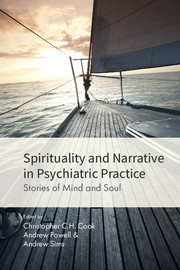Book contents
- Frontmatter
- Contents
- List of contributors
- Foreword
- Preface
- 1 Narrative in psychiatry, theology and spirituality
- 2 Spirituality and transcultural narratives
- 3 Psychopathology and the clinical story
- 4 Helping patients tell their story: narratives of body, mind and soul
- 5 Gods lost and found: spiritual coping in clinical practice
- 6 Stories of joy and sorrow: spirituality and affective disorder
- 7 Stories of fear: spirituality and anxiety disorders
- 8 Stories of transgression: narrative therapy with offenders
- 9 Narratives of transformation in psychosis
- 10 My story: a spiritual narrative
- 11 God's story revealed in the human story
- 12 Meaning without ‘believing’: attachment theory, mentalisation and the spiritual dimension of analytical psychotherapy
- 13 Stories of living with loss: spirituality and ageing
- 14 Beginnings and endings
- Index
12 - Meaning without ‘believing’: attachment theory, mentalisation and the spiritual dimension of analytical psychotherapy
Published online by Cambridge University Press: 02 January 2018
- Frontmatter
- Contents
- List of contributors
- Foreword
- Preface
- 1 Narrative in psychiatry, theology and spirituality
- 2 Spirituality and transcultural narratives
- 3 Psychopathology and the clinical story
- 4 Helping patients tell their story: narratives of body, mind and soul
- 5 Gods lost and found: spiritual coping in clinical practice
- 6 Stories of joy and sorrow: spirituality and affective disorder
- 7 Stories of fear: spirituality and anxiety disorders
- 8 Stories of transgression: narrative therapy with offenders
- 9 Narratives of transformation in psychosis
- 10 My story: a spiritual narrative
- 11 God's story revealed in the human story
- 12 Meaning without ‘believing’: attachment theory, mentalisation and the spiritual dimension of analytical psychotherapy
- 13 Stories of living with loss: spirituality and ageing
- 14 Beginnings and endings
- Index
Summary
This chapter reaches for a psychotherapeutically relevant concept of ‘spirituality’, outside any specific religious framework. As an ‘agnostic atheist’, the author identifies with E.M. Forster's ‘Oh Lord I disbelieve – help thou my unbelief’ (1951), and from that starting point will argue first, that there is a ‘spiritual’ dimension to psychological health – an aspect of mentalised secure attachment – and second, that this manifests itself in the inner narratives that emerge in successful psychotherapy.
The phenomenology of therapeutic spirituality
I start with some aspects of psychotherapeutic practice that might usefully be thought as having a spiritual dimension. Three overlapping themes stand out.
Transcendent experiences
Here is a retrospective account from a 70-year-old psychotherapy patient, for whom an inner ‘spiritual’ narrative has been a continuing source of comfort through the vicissitudes of his life.
As a lonely, emotion-suppressed American adolescent on holiday in Europe, he was left to fend for himself while his parents caroused with their friends. He entered Chartres Cathedral and found himself sensing something – as he puts it – ‘other, awesome – a direct feeling of the presence of God, which has stayed with me and sustained me ever since’.
In attachment terms, this epiphany could be seen as a response of a habitually avoidant child, a product of Pilgrim Puritanism, to the subliminal (c.f. ‘sublime’) cues of eternity, grace and ordered complexity implicit in Gothic architecture. The cathedral evoked the presence of a safe, containing, caring Other – the secure base he manifestly lacked. This in turn facilitated the emergence of hitherto inaccessible emotion, a novel and enduring sense of hope and aspiration. The spiritual narrative here typically combines an affect of uplift and care (cf. a mother picking up her crying baby) with a ‘God cognition’.
This formulation, as we shall see, is close to the lineaments of secure attachment – subliminal messages that instigate ‘broaden and build’ states of mind (Granqvist, 2006; Mikulincer & Shaver, 2007). In contrast, Sigmund Freud's famous discussion of The Uncanny emphasises the infantile and regressive aspects of transcendent experience. For Freud, omens and portents represent repressed wishes untempered by reality, illustrating ‘the omnipotence of thoughts’, ‘instantaneous wish fulfilments’ and ‘narcissistic overestimation of subjective mental processes’ (Freud, 1919, reprinted 2001a: p. 243).
- Type
- Chapter
- Information
- Spirituality and Narrative in Psychiatric Practice , pp. 145 - 159Publisher: Royal College of PsychiatristsPrint publication year: 2016



